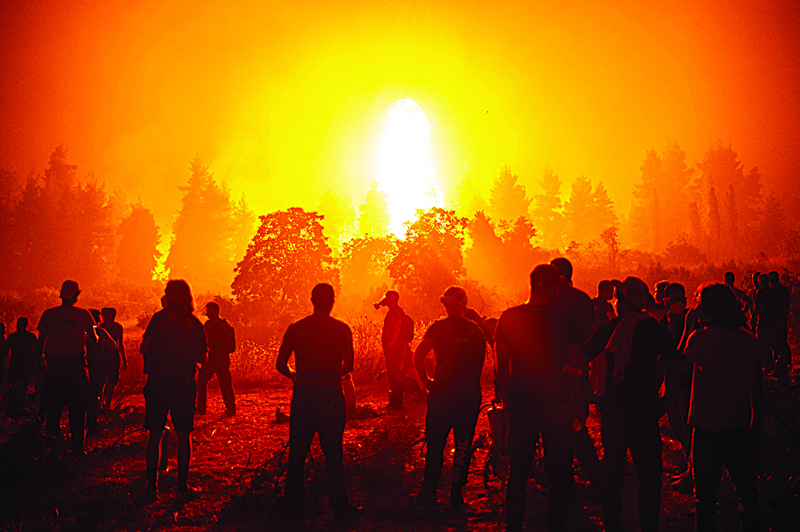 Local youths and volunteers gather in an open field and wait to support firefighters during a wildfire near the village of Kamatriades near Istiaia on Evia island on Monday. - AFP
Local youths and volunteers gather in an open field and wait to support firefighters during a wildfire near the village of Kamatriades near Istiaia on Evia island on Monday. - AFP
AVGARIA, Greece: Volunteers and firefighters worked round-the-clock yesterday, often without masks or helmets, in a desperate bid to stop a violent blaze from reaching a town on Greece's Evia island, one of hundreds of fires that have raged through the country. Nearly 900 firefighters, reinforced overnight with fresh arrivals from abroad, were deployed on the country's second largest island as major towns and resorts remained under threat from a fire that has been burning for eight days.
Prime Minister Kyriakos Mitsotakis apologized to the nation, saying more than 580 fires had broken out in recent days around the country, exposing Greece to a "natural fury without precedent". Unprecedented weather disasters bulked up by climate change have swept the world this summer, with a landmark UN assessment published Monday warning the world is warming even faster than forecasted.
Hundreds of homes have been lost in Evia, greater Athens, the Peloponnese and other parts of Greece in wildfires that have been raging almost without pause since late July, as the region suffers through an intense heatwave. The fires have claimed three lives in Greece, while blazes in neighboring Turkey have killed eight. Several people have been injured, some critically.
'Where to go?'
Yesterday, much of the attention was focused on keeping the fire out of Evia's northern hub of Istiaia, which has 7,000 residents who had yet to evacuate. Firefighters and volunteers had been engaged overnight in "hand-to-hand combat, fighting heart and soul" to erect fire breaks outside villages neighboring Istiaia, Mayor Yiannis Kontzias said.
Often wearing just a t-shirt, the locals battled the flames on several fronts, one of which raged out of control. The Evia force includes hundreds of firefighters from Romania, Serbia and Ukraine. They were reinforced on Tuesday with units from Cyprus, Slovakia and Poland, the civil protection authority said. The rugged island is popular with holidaymakers and many Greeks have summer homes in Evia. Some 3,000 people were evacuated by sea this past week as the flames neared.
Authorities ordered the evacuation of Asiminio, a coastal village near Istiaia also threatened by flames yesterday. "Where do you want us to go?" a woman in her sixties shouted, refusing to leave as helicopters flew ahead. On the streets of the village, dozens of residents pointed angrily at a Slovakian firefighting truck. "Look, they're doing all the work. Where are ours? We beg them to come and no one comes," said Dimitri.
In the village of Avgaria, many locals have turned out to help the professionals. "If we don't come, who will?" asked Yiannis, a burly youth in his 20s. "My aunt's house burnt down, that of my grandfather almost did too." The fire has also wrought havoc on the island's agricultural economy that included resin, olives, figs and honey, leaving many local producers despondent.
Istiaia Mayor Kontzias said "mistakes were made and we need to draw lessons from this". "The Greek state must never forget what happened in northern Evia," he added. "Helicopters helped a lot and if we had done that since the beginning, we would have avoided all this destruction." He was echoing a complaint widely uttered about the lack of air support not just on Evia but throughout Greece. Many mayors around the country have complained of a serious lack of aerial support in fighting the fires, despite the government's assurances of having set aside ample resources earlier this year.
'Dagger to the heart'
"Every lost home is a tragedy, a dagger to the heart," Deputy Civil Protection Minister Nikos Hardalias said Tuesday, his voice breaking. In a televised address on Monday, Mitsotakis apologized "for any shortcomings" in the state response. "We may have done what was humanly possible, but in many cases it was not enough. Because of the unprecedented heatwave and prolonged drought, (the fires) are hard to extinguish," he said.
The PM has pledged hundreds of millions of euros in additional funds for civil protection, reforestation and flood prevention. He was chairing a cabinet meeting yesterday to finalize support measures, and will address the press tomorrow. There was still concern Tuesday about three separate fires in the Peloponnese peninsula, where villages were still without electricity and water, according to local officials.
More than 400 firefighters were active in that area, including reinforcements from the Czech Republic and Britain. EU states and other countries have so far contributed 21 aircraft, 250 vehicles and more than 1,200 firefighters, some of whom were expected between yesterday and Friday, the civil protection authority said. - AFP




